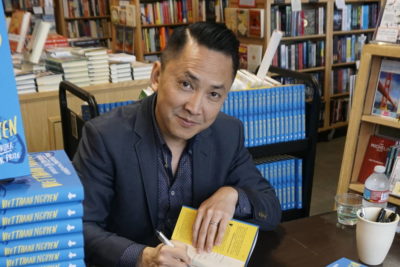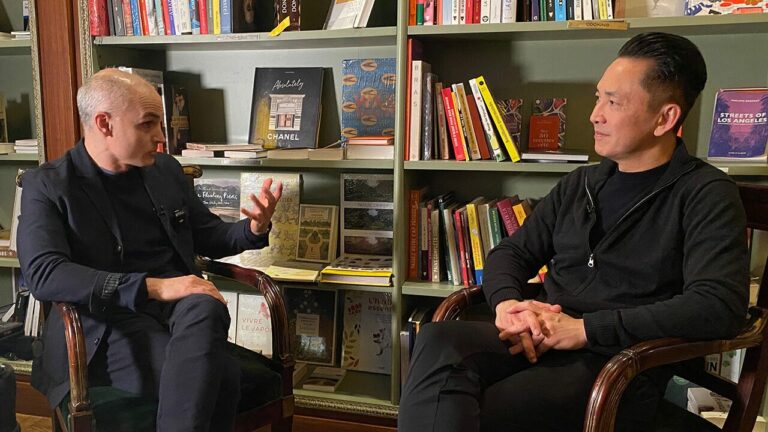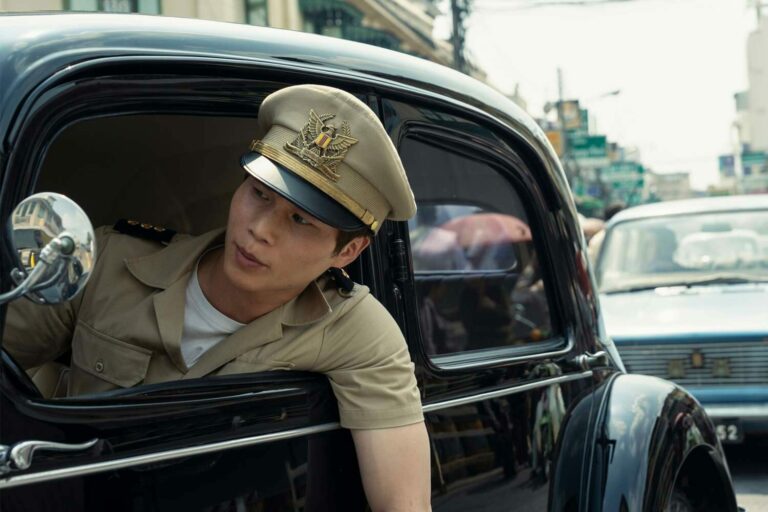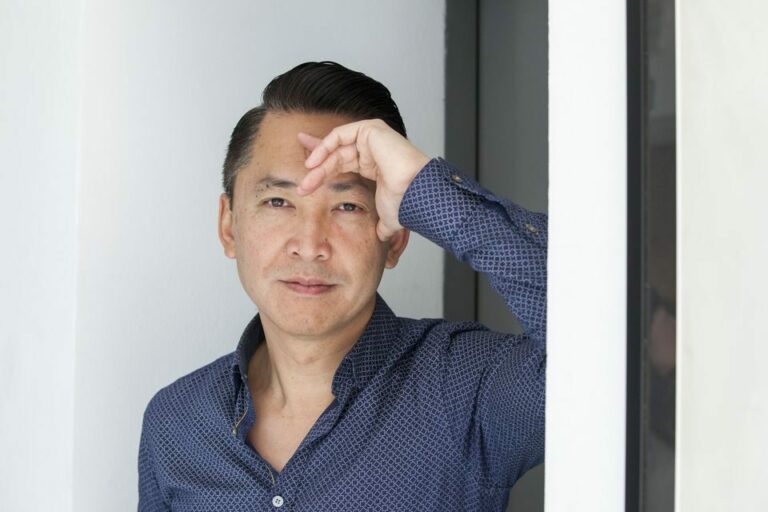Viet Thanh Nguyen discusses The Refugees and his personal experiences as a refugee in this interview for KQED News.

Viet Thanh Nguyen is an award-winning writer who grew up in San Jose after immigrating to the United States with his family in 1975 as a refugee fleeing the Communist-controlled country. He is a professor at the University of Southern California and the author of the 2016 Pulitzer Prize-winning novel, “The Sympathizer”. His newest book is a collection of short stories called “The Refugees.”
We spoke with Nguyen about his decades thinking about, writing about and living the life of a refugee.
Can you start by sharing your memories of coming to the U.S. as a refugee?
I came to the United States in 1975 when I was four years old, and I came as a refugee.
The small town we were living in was the first town overrun by the final communist invasion. My father was actually in Saigon on business, and my mother had to make a life and death decision about what to do. So she decided to flee.
My brother and I and my mother walked to the nearest port town 184 kilometers away. We were able to get on board a boat or barge and make it to Saigon, find my dad, and then a month later, the communists took Saigon as well.
So we had to repeat the experience, trying to get out by the airport, trying to get out by whatever means necessary. Finally, we got out on another barge or boat picked up by the U.S. Navy and were taken to Guam and then we flew from there to Fort Indiantown Gap, in Pennsylvania, which is where my memory really begins.
So how much of that journey is etched in your memory and how much of it comes from what other people have told you?
I remember being taken away from my parents at 4 years old and sent to live with a white sponsor family while (the rest of my family) were sent to live with another family. That is a part of the refugee experience — to be displaced and to have your lives suddenly at the mercy of other people’s decisions.
You’ve said that your family didn’t talk much about their refugee experience, or if they did it was through silences. Do you think that that’s part of the reason why those stories don’t end up getting told? Because it’s painful for people to relive those experiences?
That’s partially true. I mean I met many second generation Vietnamese-Americans who are not aware of what their parents have gone through. My own students for example, say “Well I think my parents came on a boat.” And they don’t know and because their parents don’t want to talk about it and I understand why. Because someone asks you what was it like and they expect an answer in a couple of minutes and you’re supposed to try to convey a lifetime in that couple of minutes to even make sense out of what happened to you. So there’s a reluctance to talk. But I think even when people do talk — and there are people who do talk in Vietnamese about their stories — the people who cannot speak Vietnamese can’t hear it or don’t want to hear it.
You’ve talked about people sharing their experiences within the community in Vietnamese, and you’ve also said that you know you’re not writing for a white audience necessarily with your work. How do share those experiences in a way that creates empathy in a climate where some people have the notion that refugees are dangerous?
Well I think all novelists, all writers and artists work to create empathy and that’s the basic material for what it is that we do. I don’t think my work is any different. I mean the problem is not in getting people to read the books or watch the movies. The problem is the distribution of information. And the problem is that either some people live in places where they don’t get this information or they don’t want to get this information. If somebody picks up my book I’ve already won half the battle. But I think the real challenge is to get people to pick up the book.
Your new book “The Refugees” is a collection of stories that you wrote over two decades. You have a young woman who sees the ghost of her brother. You have this dynamic between two women of the same age within the Vietnamese community in San Jose. They’re all stories of Vietnamese refugees, but told from different perspectives.
I think there is a great degree of emotional similarity across these different kinds of experiences. And certainly that was what I wanted to try to do with the book, to talk about people whose stories I knew very intimately and whose stories I also knew that most Americans knew nothing about.
‘We don’t see refugees as courageous. We see refugees as as pitiful. And I think I hope that my own book and the stories of other refugees work to make it clear that they’re not pitiful — that they’re only pitiful because of their circumstances.’
So the primary challenge of the of the collection was simply to convey the humanity of these people and their complexities and the nuances. So these stories range the spectrum from older people to younger people, gay and straight men and women and military and so on, to try to convey the fact that we cannot stereotype or flatten out or homogenize even a national or an ethnic population and the diversity of these people is exactly the diversity of other communities.
What can you tell us about American public opinion at the time that Vietnamese refugees were coming to the U.S. in the ’70s and ’80s?
Well, the U.S. just ended a very terrible war with the communists in Vietnam. But I think many Americans saw all Vietnamese as being rather foreign whether they were on the American side or not on the American side. So in 1975 when Congress was admitting Vietnamese refugees into the country, opinion polls show that the majority of Americans didn’t want to accept Vietnamese or other Southeast Asian refugees.
I notice in your work that you make this distinction between immigrants and refugees. Why is that?
I think it’s really important to assert that I am a refugee rather than an immigrant because when my book came out, when “The Sympathizer” came out so many of the reviews were saying this is an immigrant novel. I understood why they were saying that because the idea of the immigrant experience is absolutely central to the American story or the American mythology. Even though at periodic points in American history the United States has been actually rather anti-immigrant. Nevertheless the idea of the American dream is that we welcome immigrants to these shores. And so the easiest way to make sense out of somebody like me who was born elsewhere is to call me an immigrant which implicitly turns me into a success story.
Refugees are much more threatening than immigrants. Immigrants voluntarily come to our country. They’ve chosen our country. Refugees have been forced out by circumstances and they are the unwanted in the countries that they come from. And that is one of the reasons why I think Americans and other people from other countries have a hard time dealing with refugees because of the stigma that they carry of being unwanted.
On the other hand you have some Americans who feel great compassion for refugees because they’re ‘legitimate’ migrants fleeing war, versus migrants fleeing economic or environmental devastation.
So there’s always been that tension within the United States and in other countries obviously. But so far as the question of whether refugees are more desirable than immigrants for some people I think that’s absolutely true.
You said this is the stuff of fiction what’s happening right now with refugee policy. Is there anything that you feel when you look at these experiences of Syrians and people from the Middle East that resonates with the experience of the Vietnamese community back when you came?
One of the things that I did in doing research for my nonfiction work was to visit a refugee camp in Indonesia. So the Vietnamese refugees who were fleeing — the so-called “boat people” — were trying to make it to neighboring South-East Asian countries like Indonesia. And it was a very horrible experience you know. And some estimates are that half of the people who went out to sea didn’t survive. They just disappeared somewhere. And at this refugee camp there there was a cemetery and there are gravestones marking people who had died when they were 80 and marking people who had died when they were zero or three months. And I think then that we do share something in common with the Syrians for example who were trying to flee their country by boat. The terror, the fear. The odds being stacked completely stacked against you. There’s a line in one of my stories I think where I say, you know to be a refugee is to be enormously courageous because you go out on that boat to the open sea knowing that the likelihood is that you’re going to die.
But we don’t see refugees as courageous. We see refugees as as pitiful. And I think I hope that my own book and the stories of other refugees work to make it clear that they’re not pitiful — that they’re only pitiful because of their circumstances. But it takes enormous initiative as well as fear to take your life into your own hands and to risk it in that fashion and that is something that the Vietnamese and the Syrians shared.
How do you think your experience growing up as a refugee in California may have been different from the experience of refugees who grew up in other parts of the country?
I think that the refugees who ended up in California either because they were put there by government policy or because they voluntarily migrated thought of themselves as lucky because of the weather, because of the diversity, because of the economic and social welfare opportunities.
We also had the advantage of living in strong Vietnamese-American centers of population. Whereas if you were in some city in Kansas there might’ve been 100 or 200 Vietnamese people. That made a big difference. You know you didn’t grow up feeling alone. You had all of the typical problems of being a refugee but at least you had the community with its churches, its stores its social services, its language. And that helped people to create a sense of home a displaced home not in the old country, but still, a Little Saigon or something like it.
So many of your stories touch on dislocation, a sense of not belonging. Do you still feel like a refugee?
I still feel like I am a refugee although I’m not certain whether I’m romanticizing myself. Obviously I am not a refugee in any material sense. I have made the transition as one colleague jokingly says from ‘being refugee to bourgeoisie.’ And no one would ever mistake me for a refugee unless I said it. But I feel like I’ve been shaped by my refugee experience and psychologically part of me is a refugee. I don’t feel completely at home. I feel like I’m still somewhat of an outsider. And again maybe I cultivate that because being an outsider helps me to be a writer.
You’ve just come off of the great success of “The Sympathizer” and now you’re moving into this collection of short stories. What’s that transition been like?
Well, it’s an unreal experience because it took 20 years from the first words of this book to seeing it published. And I think in the last few years I’d resigned myself to the possibility that the book was never going to be published and I had actually gotten to the psychological mindset of thinking. “Well I didn’t waste 20 years of my life. I used those 20 years to learn how to be a writer.” It’s a feeling of relief more than anything else, seeing it out there.
An excerpt from “The Refugees”:
I liked school even summer school. It was like being on vacation from home. And at 3 o’clock I was always a little disappointed to walk the four blocks to the grocery store. My parents owned the new Saigon market where English was hardly ever spoken and Vietnamese was loud. My mother and father rarely left their posts. The cash registers flanking the entrance of a new Saigon. Customers always crowded the market. One of the few places in San Jose were the Vietnamese could buy the staples and spices of home. People haggled endlessly with my mother over everything beginning with a rock sugar which I pretended was yellow kryptonite and ending with the varieties of meat in the freezer from pork chops and catfish with a glint of light in their eyes to shoestring s of chewy tripe and packets of chicken hearts small and tender as button mushrooms. Can we just sell TV dinners, I asked once.


